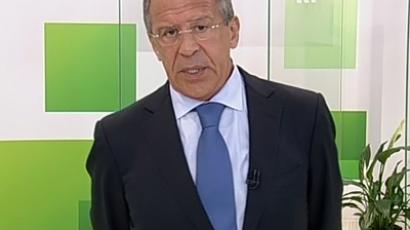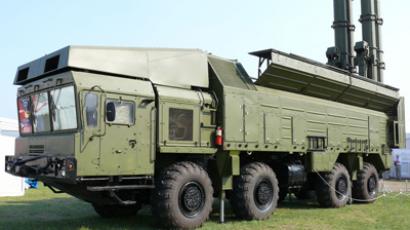Turkish PM claims diverted Syria-bound plane was carrying munitions for Damascus
The Turkish PM alleged that the Moscow-to-Damascus commercial flight diverted to Ankara was carrying munitions for the Syrian army. The Russian Foreign Ministry said it received no explanation from Turkey detailing the plane’s cargo and its seizure.
"It is absolutely clear who sent the cargo and who was going to receive it. This was munitions from the Russian equivalent of our Mechanical and Chemical Industry Corporation being sent to the Syrian Defense Ministry," Erdogan told journalists, referring to the state-run Turkish manufacturer that supplies the country's army."The examination [of the seized cargo] is continuing and the necessary will follow," the PM added.“The Russian Federation has still received no information about the cargo confiscated by the Turkey, the reasons and considerations of the forfeiture. Russia has repeatedly demanded and continues to insist on submission of this information,” the Russian Foreign Ministry said in a statement.The Syrian Foreign Ministry refuted the allegations as “absolutely untrue” in a brief statement on Thursday. Ministry spokesman Jihad Makdissi stressed that the plane was not carrying ammunition or any other illegal cargo.Earlier on Wednesday Ankara had sent a diplomatic memo to its Arab neighbor on grounds that the plane was carrying "certain equipment in breach of civil aviation rules." Syria branded the Wednesday incident "piracy," and said there was nothing illegal on board the Airbus A-320. The plane operator’s chief Ghaida Abd Al-Latif said their plane was carrying civilian electrical equipment.Russia’s state-run arms exporter Rosoboronexport said that it had no cargo on the flight.Russian airport representatives also said that customs and security services did not find anything suspicious in the cargo before the 35-passenger plane was cleared for takeoff. All the relevant inspection documents were passed over to officials for investigation, the Vnukovo Airport press service said.Military analysts and industry insiders say it is unlikely that Moscow would use a civilian aircraft to send military cargo to Syria. “Even if it really were necessary to send any military equipment or arms supplies, it would have been done as required by law, not illegally, using a civilian jet,” a top official in Russian’s military export industry told Interfax. “There were no weapons, no systems or components of military equipment on board, and there could never be.”Russia is not a signatory to the international arms embargo on Syria. However, Moscow announced in July that it would only honor old arms contracts with the Arab country, and refused to sign any new deals while the country's violent civil war continues.President Vladimir Putin has also repeatedly vowed that any military supplies it sends to Syria cannot be used in civil conflicts.
Forced landing turned diplomatic scandalTurkish F-16s forced the Airbus A320 to land at Ankara's international airport at around 5:15 pm local time. The plane's crew and 35 passengers had to spend around nine hours while the cargo was inspected. After the Turkish security forces confiscated some of the load, the plane was allowed to take off again.The plane’s crew claims that instead of ordering it to land, Turkey straightaway dispatched fighter jets. The abrupt appearance of F-16s close to the plane posed an immediate danger to the lives of everyone on board, says Syrian Air chief Ghaida Abd al-Latif.Sherin Azis, a hostess on the plane, told RT that the crew and passengers waited for two hours before Turkish officials approached the plane. Witnesses add that while the cargo was inspected they did not catch sight of weapons, or, indeed anything suspicious. They also complain of poor and at times aggressive treatment. Al-Latif said that Turkish officials beat up a crew member and several passengers after they refused to sign a statement that the plane had made an emergency landing. A stewardess also said Turkish officials threatened to detain the pilot if he did not sign the documents.The flight engineer, Jasem Kaser, says the crew was taken out of the plane in handcuffs and at gunpoint.The Turkish officials "opened the freight space and started taking pictures of the cargo. They opened boxes, checked the shipping list. Though there was nothing suspicious there, they ordered us to leave,” Kaser said. “Then they ordered the boxes be taken out, so I asked for a receipt. They urged us to disembark and said they’d give a receipt later. This took around half an hour. Then they pointed their guns at us, cuffed us, put in two cars and took us to the ramp.”
The passengers, many children among them, were not allowed to leave the plane and were not supplied with food, said Russian Foreign Ministry spokesperson Aleksandr Lukashevich. Russian medics and diplomats were not allowed to the scene. The Turkish Foreign Ministry later wrote it off as a mistake caused by the fact that the pilot “refused to disclose the passenger list.”Moscow slammed Ankara for endangering the lives of Russian passengers when it intercepted the jet late on Wednesday – something Ankara denied Thursday. The Turkish Foreign Ministry also insisted that its aviation officials warned the pilot of their intentions and gave him a chance to turn back to Russia, but that he chose not to do so.Turkey says it will stop more Syrian civilian aircraft using its airspace if necessary. Meanwhile, Turkish passenger planes have been instructed to avoid Syrian airspace, as it is viewed as unsafe."We are determined to control weapons transfers to a regime that carries out such brutal massacres against civilians. It is unacceptable that such a transfer is made using our airspace," Foreign Minister Ahmet Davutoglu said.
Relations between Syria and Turkey have accelerated going downhill after deadly cross-border shelling a week ago. Mortar shells fired from Syrian territory killed five civilians in a Turkish town. Turkey responded by retaliatory fire, as well as deploying troops, armored vehicles and F-16 fighter jets along the volatile border.Ankara, once an ally of Damascus, has become an outspoken supporter of the 19-month-long uprising in Syria that seeks to topple President Bashar Al-Assad’s regime.














